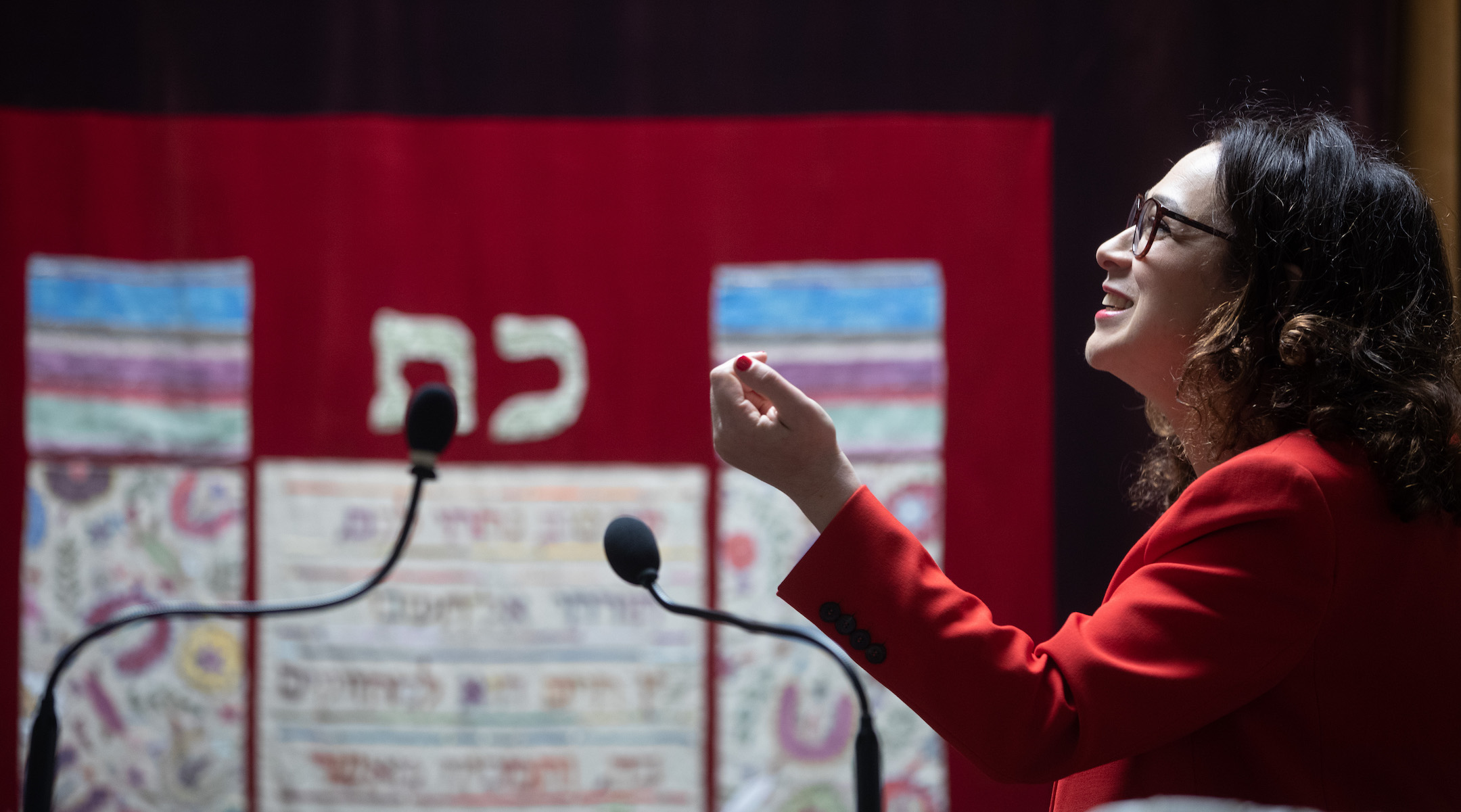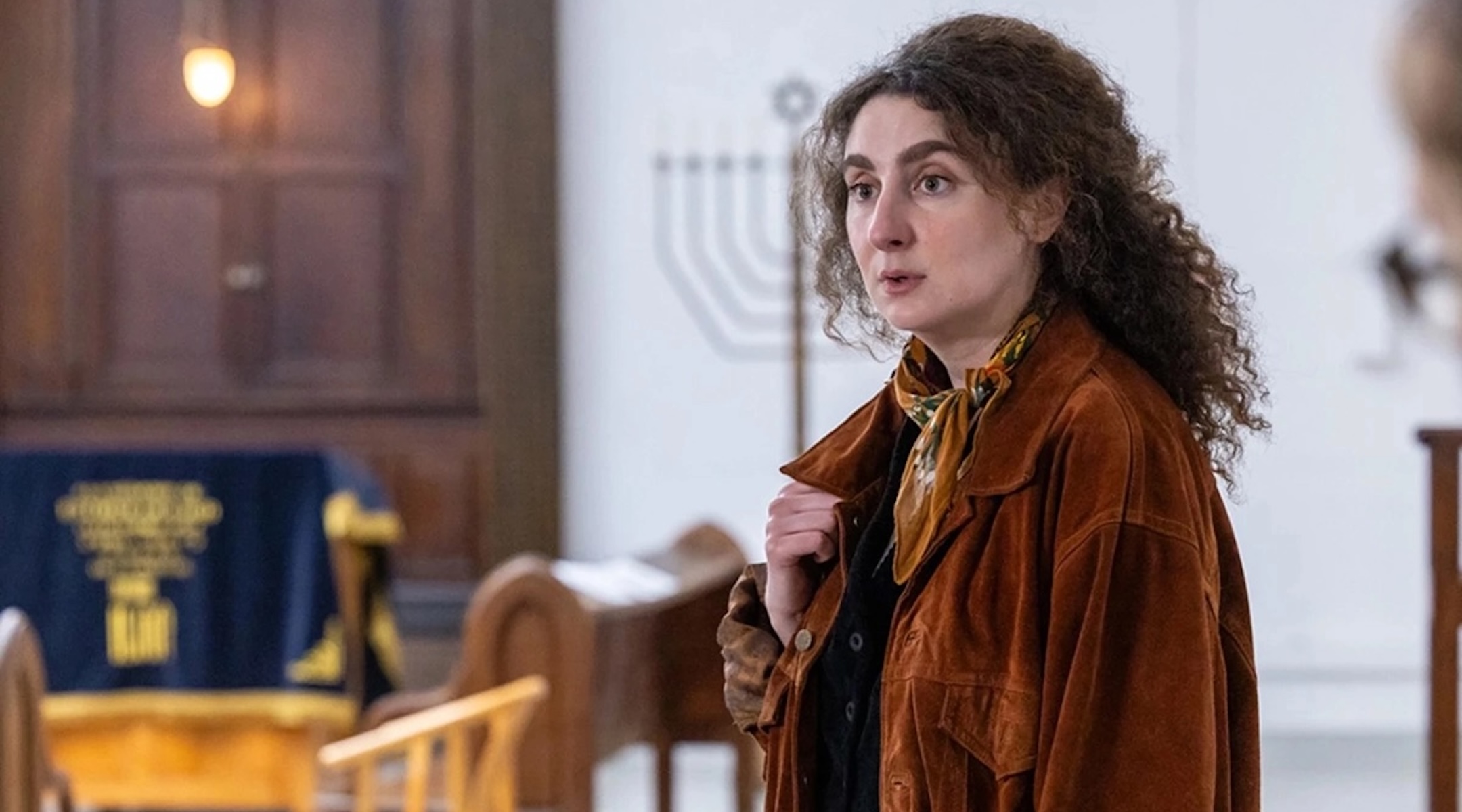(JTA) — A young woman rabbi attempts to guide others while grappling with her own questions and facing down a community’s utter bewilderment that she is in fact the rabbi.
The situation makes a premise ripe for comedy and drama in the new Max series “Reformed,” or “Le Sens Des Choses” in French.
It was also a real chapter in the life of Delphine Horvilleur, the third female rabbi in France and a public intellectual known for leading the country’s Liberal Jewish movement and advocating for Muslim-Jewish dialogue.
“Reformed,” which premiered on Friday, took inspiration from Horvilleur’s internationally bestselling memoir, “Living With Our Dead.” The French dramedy was created by Noé Debré and Benjamin Charbit and produced by Fédération Studios.
The writers interviewed Horvilleur about her work and practice as a rabbi but decided to make a series that largely departed from her book.
“Living With Our Dead,” originally published in French in 2021 and English in 2024, comprises 11 essays about the dead who still live with Horvilleur. They range from private friends to more well known figures, such as Elsa Cayat, a Jewish columnist killed in the 2015 terrorist attack on Charlie Hebdo, and Israeli Prime Minister Yitzchak Rabin, assassinated by a right-wing extremist in 1995 at the end of a rally that Horvilleur attended, where he promised Israeli-Palestinian peace.
Léa, the heroine of “Reformed” played by Elsa Guedj, lives in a world more sequestered from the political violence and war that encroach on modern Jewish life. The series opens in picturesque and peaceful Strasbourg, where she navigates emotional but comedic conflicts between her first visitors — an intermarried couple who can’t agree about the circumcision of their child, in the first episode, and a son who refuses a bar mitzvah because of his concern about climate change in the second. These community members go to Léa for answers that the hesitant new rabbi finds difficult to provide.
This week, Guedj was awarded best actress in a French series at Series Mania, an international TV competition.
Although Horvilleur called Léa “very different from me,” she said in an interview that the character incorporates her teachings about embracing uncertainty.
“They decided to create a character that is very full of doubt, which is nice as a way to remind people that actually, certainties are very often a threat in the religious realm,” said Horvilleur, who is now 50 and the mother of three teenagers.

During the pandemic, Rabbi Delphine Horvilleur found a large audience online. (Courtesy of Horvilleur)
She herself, as a young woman, debated for years over her path. She questioned if she wanted to be a congregational rabbi or a Jewish writer, teacher or philosopher — and finally decided to build her rabbinate on refusing to choose among those commitments.
“The reason I can teach and speak in the media, and be present in intellectual French life, is because I accompany people on a daily basis,” said Horvilleur. “And vice versa — I feel that my congregational work as a rabbi is very nurtured by the fact that I have a commitment towards French society.”
While women rabbis have become commonplace in the United States, they are still a rarity in France, dominated by a more traditional and right-leaning Jewish world. As of 2023, there are only seven in a country of about 440,000 Jews.
When Horvilleur became a rabbi, women were not yet being ordained in France. Her path was unconventional in other ways: Born in Nancy to parents who preserved Jewish culture but were not significantly observant, she grew up without any ideas of becoming a rabbi. At 17, she went to study medicine at the Hebrew University in Israel, where she also became involved with the left-wing Meretz party pushing for an Israeli-Palestinian two-state solution.
After Rabin’s assassination, she returned to France and worked as a journalist. But she brought from Jerusalem a love of interpreting ancient Jewish texts, and studied with figures such as the philosopher Marc-Alain Ouaknin and former Chief Rabbi Gilles Bernheim.
Finding it impossible to study the Talmud as a woman in France, Horvilleur went to Drisha Yeshiva in New York before enrolling at the Reform movement’s Hebrew Union College in 2008. Back in Paris, her profile grew as a leader of the Liberal Jewish Movement of France — affiliated with the World Union for Progressive Judaism — and as the rabbi of the Beaugrenelle synagogue, which gathers over 1,000 families. She also edits Tenou’a, a prestigious magazine on religion and art.
Early on, Horvilleur faced the challenge of proving her legitimacy as a young woman rabbi — a task shared by Léa in “Reformed.” But Horvilleur, a burgeoning public figure, also had to fend off attacks for her political stances. Early in her tenure, after saying in a television interview that Jerusalem should not be used as a political pawn by the United States and may become a Palestinian capital, in addition to the capital of Israel, Horvilleur was harassed by a vocal minority of ultra-conservative French Jews.
Horvilleur — who experienced a breakout moment for any rabbi when she was the cover model for Elle France in early 2020 — is a longtime liberal. She is married to Ariel Weil, an economist and the Socialist Party mayor of Paris Centre, a portion of the city that includes historic Jewish neighborhoods.
Despite drawing criticism, she did not back down from questioning Jewish supremacy in Israel. Two weeks before Oct. 7, 2023, as masses of Israelis rallied against Prime Minister Benjamin Netanyahu’s bid to weaken the judiciary, Horvilleur gave a Yom Kippur sermon condemning Israel’s far-right government. In her 2025 book “How Isn’t it Going?,” she wrote, “Their cult of the land and religious supremacy is, from my point of view, as far as possible from what Jewish wisdom has taught us.”
For many years, Horvilleur has defined herself as a liberal, pro-Israeli, pro-Palestinian, pro-peace rabbi who seeks to build bridges between Jews and other communities. She acknowledges that after Oct. 7, everything she embodies can look naive — sometimes even obsolete. During wartime, she observed, “you always fire at the bridges.”
The Middle East war has reverberated sharply in France, home to Europe’s largest Jewish and Muslim communities, along with broader parts of the population outraged over the deaths of more than 50,000 Palestinians in Gaza.
A recent history of Islamic terrorist attacks on Jews and institutionalized discrimination against Muslims already complicated interfaith dialogue in France. But since Oct. 7, a new surge of antisemitic incidents have rocked the country. In one high-profile case over the summer, two teenage boys were charged with raping a 12-year-old Jewish girl and hurling antisemitic epithets at her. More recently, the chief rabbi of Orléans was allegedly assaulted and called antisemitic slurs while leaving synagogue with his son.
In this climate, many French Jews don’t just want bridges, said Horvilleur — they want to feel protected by walls. She continues to advocate for dialogue with anyone, but said that she has added one seemingly unambitious — yet increasingly complicated — limitation.
“I don’t want to be in a conversation with someone who denies the other’s right to exist,” she said. “It’s not only true for Jews or for Israelis, it’s also true for Palestinians. I believe that we have to strengthen conversations with people, even with people who disagree with us, as long as the core principle of the conversation is that the other has an absolute right to exist.”
In “How Isn’t It Going?,” penned in the aftermath of Oct. 7, Horvilleur recognizes that some perceive her as moving towards the right. She was accustomed to complaints from ultra-conservatives, but she is more hurt by left-wing groups that say she does not advocate enough for Palestinian life. While attempting to defend the rapidly vanishing position of the liberal Zionist, she has shifted away from calls to action: Asked repeatedly to join calls for a Gaza ceasefire, she has avoided doing so.
The “Reformed” series escapes thorny conversations about who can exist, and where, in favor of more universal dialogue about family relationships, marriage and religion. Still, Horvilleur hopes the show will offer a bridge of its own.
“In France, this week, is released a series about a rabbi — and Jewish life and Jewish humor and Jewish knowledge,” said Horvilleur. “It’s going to be interesting to see how people welcome it, and how it can fit this mission of telling about Jewish life, but also being a kind of bridge and gate to the larger world.”
JTA has documented Jewish history in real-time for over a century. Keep our journalism strong by joining us in supporting independent, award-winning reporting.






